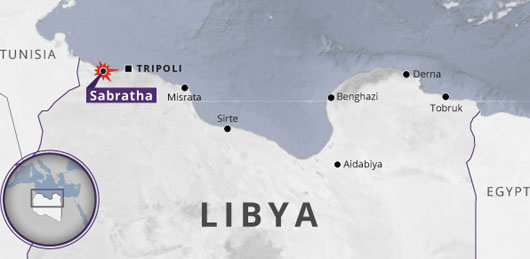by WorldTribune Staff, August 1, 2017
The continuing chaos in Libya is enabling Islamic State (ISIL) to “regroup” and renew its recruiting efforts in the Maghreb, analysts say.
Reports have said the terror organization recently moved its Libyan base to the town of Sabratha, 60 miles from the Tunisian border.
 “The majority of their fighting force comes from Tunisia, so Sabratha is also a growing center,” terrorism analyst Robert Young Pelton told Fox News.
“The majority of their fighting force comes from Tunisia, so Sabratha is also a growing center,” terrorism analyst Robert Young Pelton told Fox News.
“ISIS in Libya can regenerate quickly.”
After losing its Libyan stronghold of Sirte late last year, the number of ISIS jihadists in the country was said to have fallen below 200, according to the Pentagon.
A spokesman for U.S. Africa Command told Fox News that number currently is around 500.
Col. Ahmed Almesmari, spokesperson for the Libyan National Army (LNA), however, said ISIS’s numbers are far larger – around “five to seven thousand people of different nationalities.”
“ISIS is a transnational franchise that comes with funding, trainers and PR packages,” Pelton noted. “They seek out groups who will re-brand themselves and project the image of an international organization by standardizing logos, messaging and even design criteria for tweets and videos.”
Mohamed Ghasri, spokesperson and senior commander of the Mistrata-based al-Bunyam al-Marsous militia, said last week that the militia has observed ISIS movements south of Sirte, where they are “trying to regroup and break through our forces’ lines in the south.”
Even as it continues to lose ground in Iraq and Syria, ISIS “could prove resurgent in the Maghreb if past lessons and lingering threats remain unheeded,” International Crisis Group said in a July 24 report. “Algeria, Libya, Morocco and Tunisia should go beyond security and military measures to address persistent local grievances and tensions that ISIS has proven adept in exploiting.”
In Libya, “the struggle among powerful militias and competing interference by various regional actors produced an enabling context not only for recruitment, but even more so for ISIS’s territorial expansion,” the report said.
“Libya illustrated what Iraq and Syria proved: that jihadists’ influence is more a product of instability than its primary driver. The fact that, with Western assistance, Libyan forces were able to oust ISIS from Sirte shows that superior military force can vanquish the organization, a reality that has also been made evident in Mosul, Iraq, and will be soon in Raqqa, Syria. But that this was achieved without curing the problems that originally led to ISIS’ emergence is reason to worry.”
Subscribe to Geostrategy-Direct __________ Support Free Press Foundation
